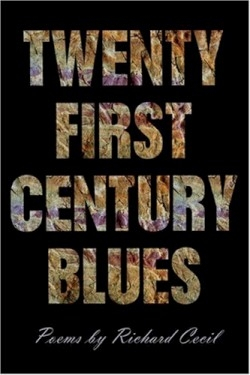Twenty-First Century Blues
A veteran of sound and sense, the author shapes his poems first with masterful craft. Line, rhythm, and diction do the work of the formal poet in these four dozen poems. His ear is unerring no matter what common subject the poem takes. He never ignores the call toward complex, on-the-mark meter.
That said, these poems are punctuated by the staccato intent of the blues. If the riffs are classic, the meaning is contemporary and wry—the blues singer looks out at his audience and winks as he sings, “Oh, what a mess I’m in.” Thus the title and final poem of this collection, “Twenty-First Century Blues,” ask, “Why should I live now?” and make it both literal—why in this century?—and figurative—why in the face of all that people lose, should they choose to live? But they do, Cecil concludes, and people learn from what they have lost, even if living is for no better reason than that they cannot help themselves.
As to tone, readers who love linguistic irony combined with the jaundiced eye that still celebrates truth will enjoy Cecil’s heady and humorous fourth book of poetry. His three previous collections include In Search of the Great Dead and Einstein’s Brain; he teaches in both the English Department and the Honors College at Indiana University.
This poet might be accused of earning the first Ph.D. in the Poetry of the Curmudgeon if his aggravating commentary on everything from fantasy Euro-travel to teaching undergraduate creative writing weren’t so bitterly witty that readers will shake their heads at the stark intelligence and humor, dark though they may be, that shine in every poem, like this selection from “Almost an Apartment in Antibes”: “Today I’m going to exercise my option / to not reserve this sea-view studio / that’s featured in the Riviera web page / by not converting eleven thousand dollars / in money market savings into francs / to wire-transfer to Credit Lyonnaise.”
The signature of these poems is the sadly ironic, and if Cecil’s work lacks the metaphorical, it also lacks the unnecessarily “flowery.” There is nothing of the pretty here (except for the gorgeous sounds), but readers will enjoy a sonnet downed with the kind of acerbic self-sarcasm they would appreciate in a beloved but opinionated friend—as in “There’s No Place Like Home.”
Young readers growing up aware of the flaws of the professional world, of the human ability to lie to oneself about everything from vacation to education, will find this book an honest exploration. Older readers who are wondering about their choice of retirement plans may find their concerns confirmed by these poems. This collection is a wonderfully funny romp through the blues of modern times.
Reviewed by
Anne-Marie Oomen
Disclosure: This article is not an endorsement, but a review. The publisher of this book provided free copies of the book to have their book reviewed by a professional reviewer. No fee was paid by the publisher for this review. Foreword Reviews only recommends books that we love. Foreword Magazine, Inc. is disclosing this in accordance with the Federal Trade Commission’s 16 CFR, Part 255.

